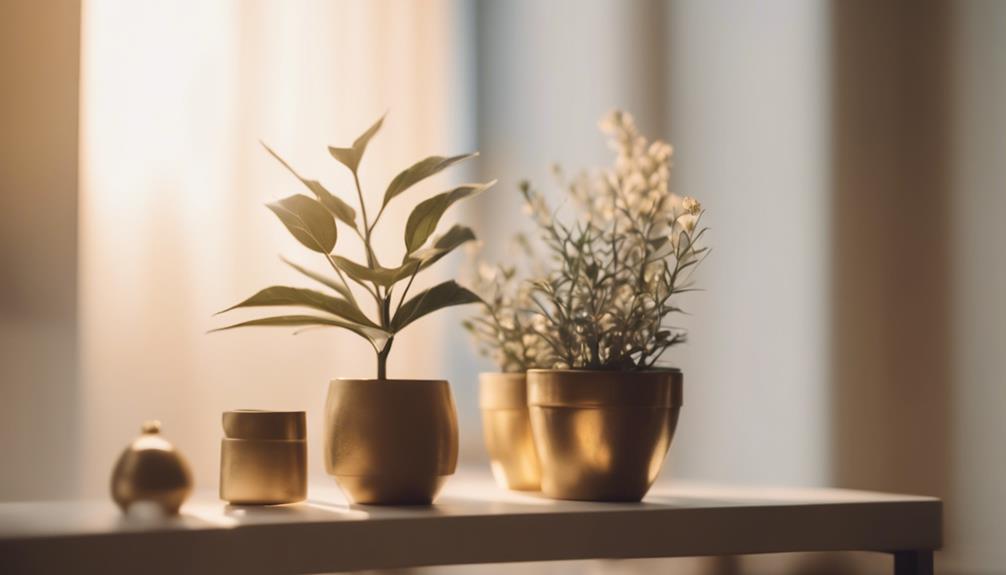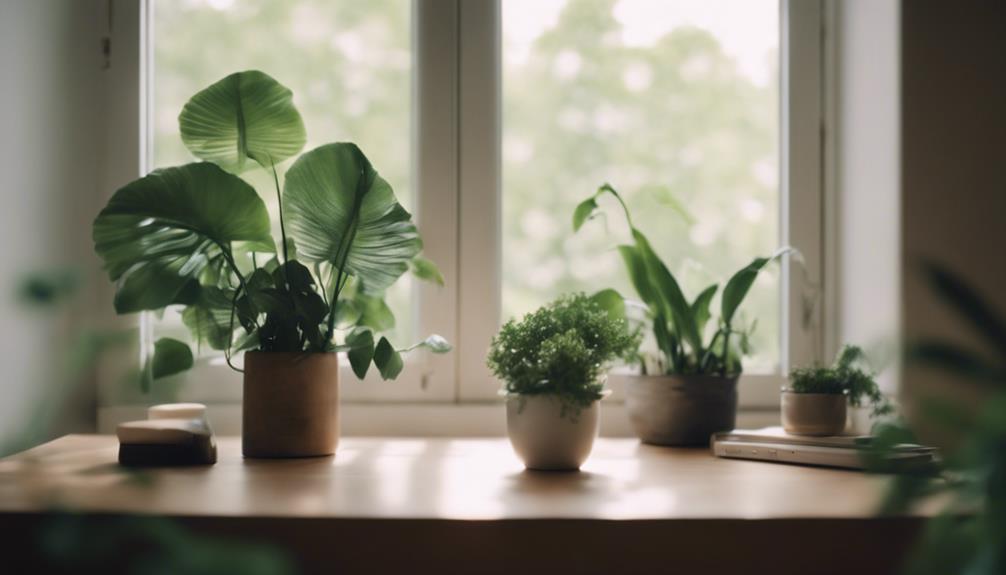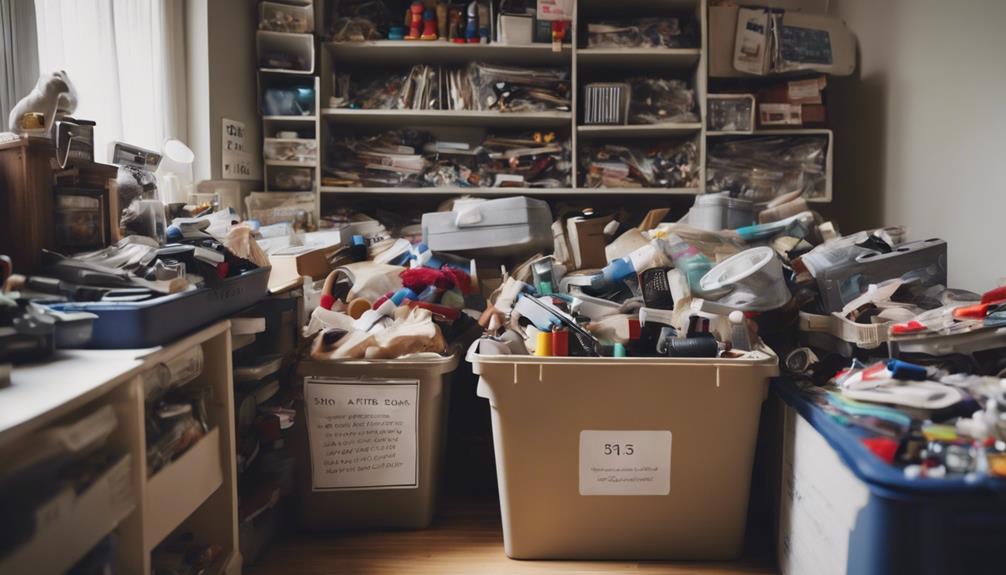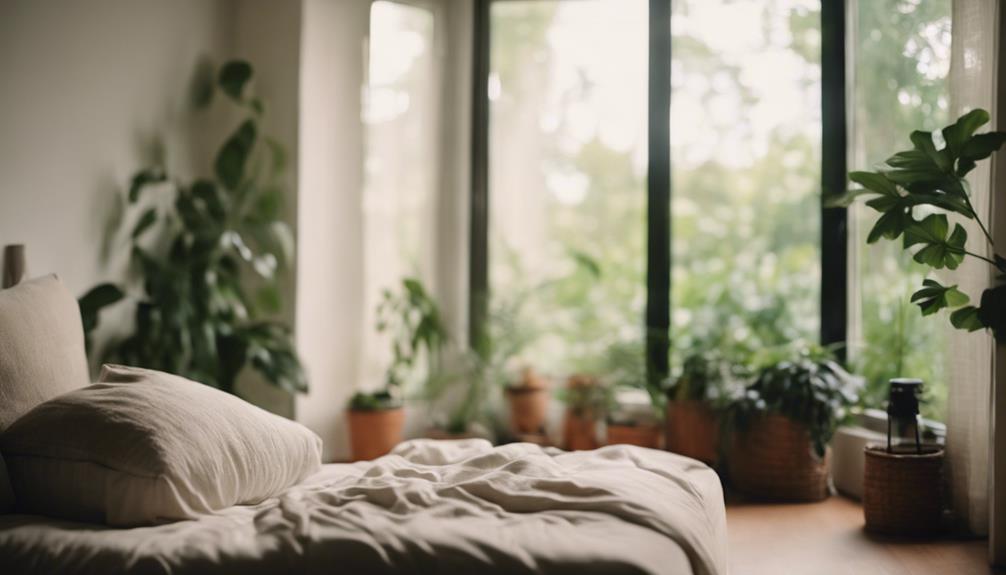We're no strangers to cluttered living spaces that overwhelm our senses and drain our energy. But it's time to reclaim our surroundings and cultivate a sense of calm and serenity. By incorporating simple decluttering strategies into our daily routines, we can create an environment that promotes relaxation and reduces stress. Mindful consumption, regular reassessment of organization methods, and intentional living can help us achieve a more peaceful space. As we let go of clutter, we free up mental energy, reduce anxiety, and create a sense of calmness. And as we explore further, we'll discover the profound impact decluttering can have on our well-being.
Key Takeaways
• Practice mindful consumption by implementing strategies like the 'one in, one out' rule to maintain a balanced and clutter-free environment.
• Focus on one area at a time to maintain motivation and energy, and set a timer for short tidying sessions to stay on track.
• Establish a serene living space through decluttering, which can extend calming effects beyond physical space, reducing stress and anxiety.
• Regularly reassess organization methods to meet evolving needs, and allocate specific days for larger organizational projects to keep living space clutter-free.
• Let go of clutter to free up physical and emotional space, releasing emotional burdens and allowing for personal growth and self-reflection.
Decluttering Strategies for Serenity
By incorporating simple yet effective decluttering strategies into our daily routines, we can create a serene and peaceful living space that fosters mental clarity and reduces stress.
We've found that focusing on one area at a time helps maintain our motivation and energy. Setting a timer for short tidying sessions keeps us on track and makes the task less intimidating.
Regular reassessment of our organization methods guarantees they continue to meet our evolving needs. By integrating small decluttering activities into our daily lives, we maintain a sense of order and calm.
We've also found it helpful to allocate specific days for larger organizational projects, keeping our living space organized and clutter-free.
Mindful Consumption for Clutter Control
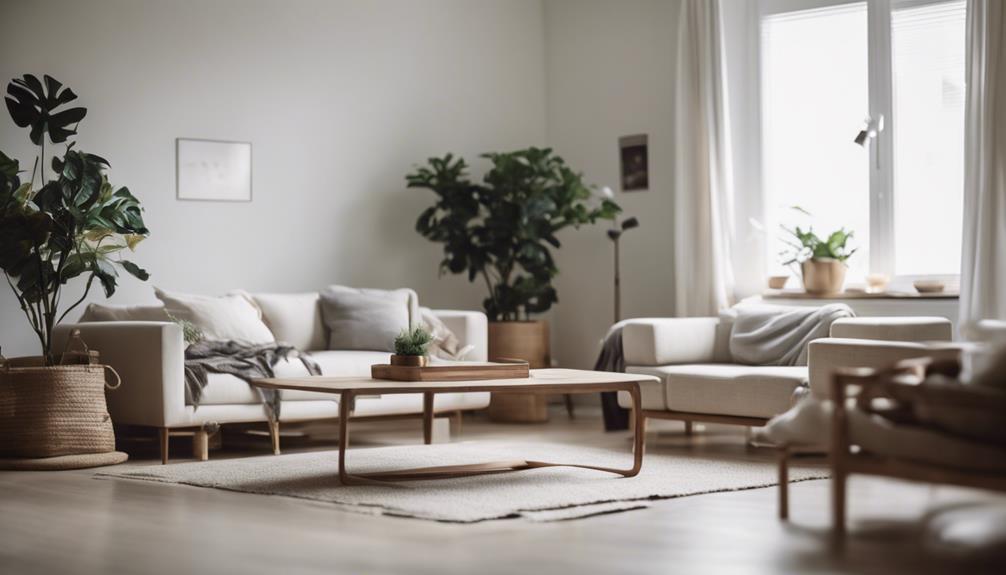
As we've successfully established a serene living space through decluttering, we're now ready to tackle the root of the problem: mindful consumption, which is key to preventing clutter from building up again.
We must become more intentional about what we bring into our space, ensuring that each item serves a purpose or brings us joy. This mindset shift is vital in maintaining our newly decluttered environment.
Here are some strategies to help us achieve mindful consumption:
- Before buying, ask ourselves if the item is a necessity or if we already have something similar.
- Set a 'one in, one out' rule to maintain balance in our possessions.
- Consider the longevity of the purchase and whether it aligns with our values.
- Embrace simplicity and appreciate the items that truly enhance our lives.
The Calming Effects of Decluttering
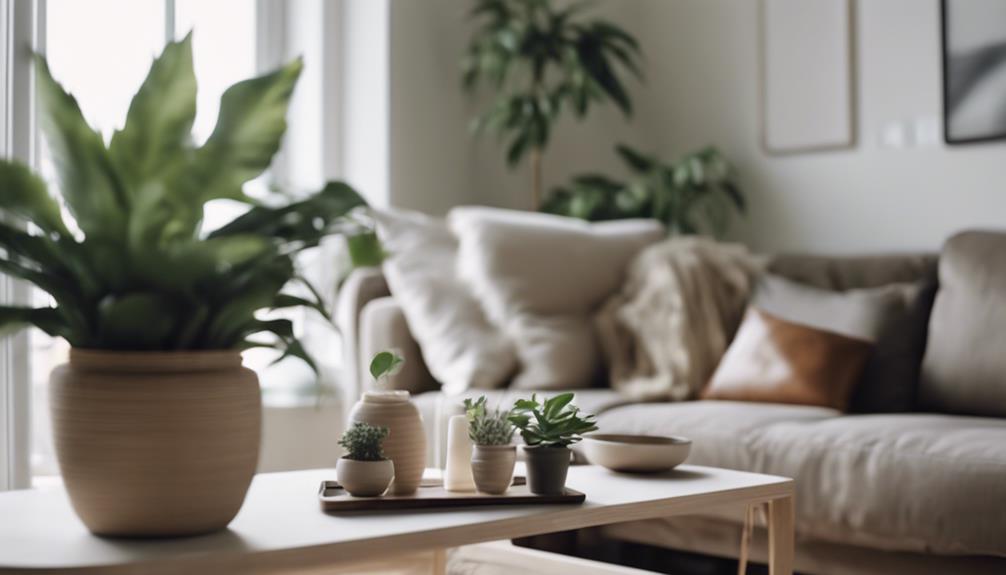
We find that decluttering's calming effects extend far beyond the physical space, profoundly impacting our mental well-being and sense of tranquility. As we clear out clutter, we're not just freeing up physical space, but also mental energy. Clutter can be overwhelming, making it difficult to focus and relax. By removing distractions, we create an environment conducive to calmness.
We feel more in control, and our minds are clearer. Decluttering reduces stress and anxiety, promoting better sleep quality and overall well-being. It's no wonder that studies link decluttering to improved mental health. By embracing decluttering, we're taking an important step towards a more peaceful, organized, and fulfilling life.
Environmental Impact of Clutter
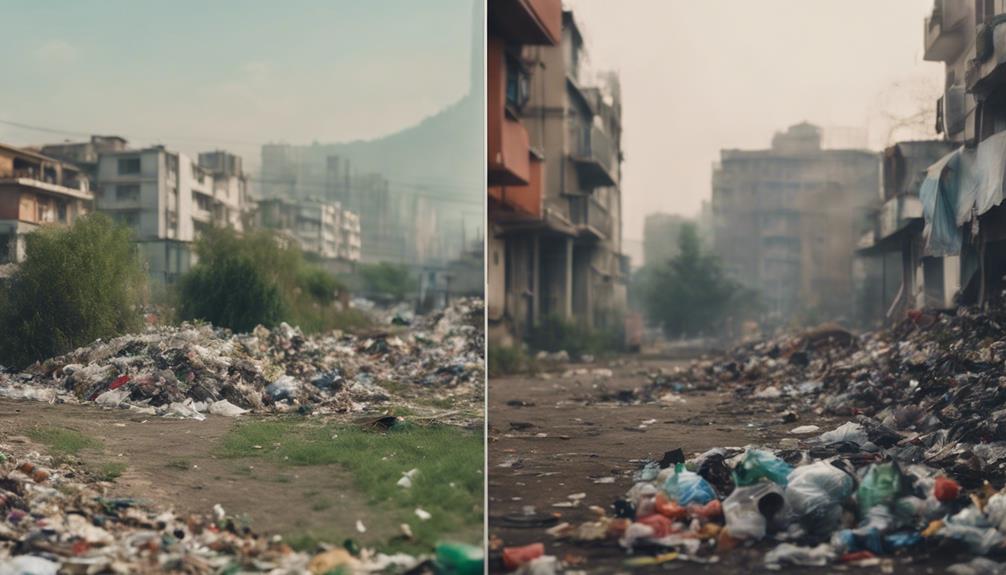
Every year, millions of tons of waste end up in landfills, with a significant portion of it being clutter that could have been recycled, repurposed, or reused. We're not only wasting resources but also contributing to environmental degradation. It's essential to acknowledge the environmental impact of clutter and take steps to reduce our waste.
- Piles of discarded electronics and batteries leaching toxic chemicals into the soil
- Overflowing landfills releasing methane, a potent greenhouse gas
- Rivers and oceans choked with plastic waste, harming marine life
- The carbon footprint of producing new items to replace discarded ones
Emotional Freedom Through Decluttering
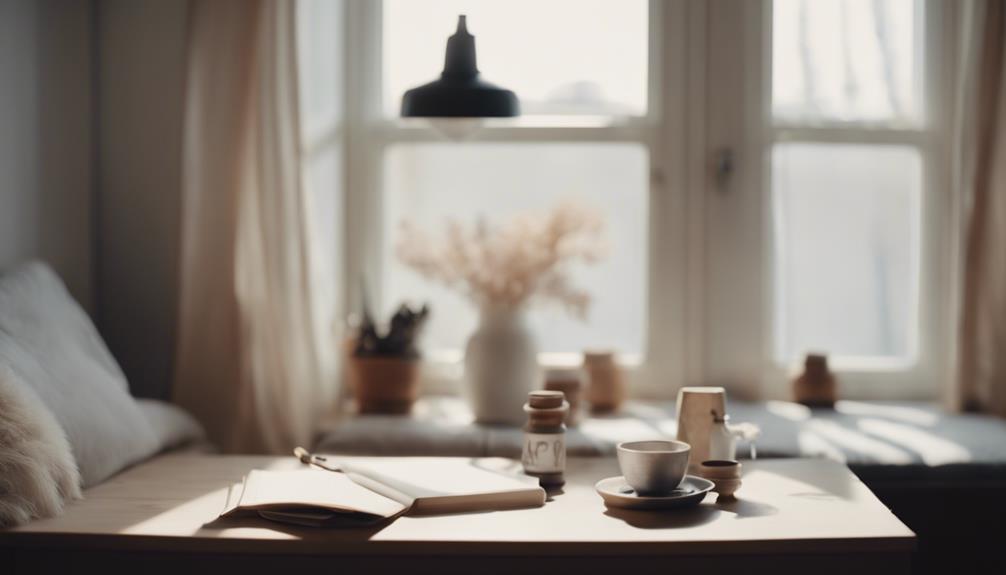
By letting go of clutter, we're not only freeing up physical space, but also releasing emotional baggage that's been weighing us down.
Clutter can symbolize unresolved emotions, memories, and attachments. As we declutter, we confront these emotional attachments, allowing us to process and release them.
This emotional freedom brings a sense of lightness and clarity, allowing us to focus on what truly matters.
By releasing physical clutter, we're also releasing the emotional burden that comes with it. We begin to see that our possessions don't define our worth, and we're able to break free from the emotional grip of clutter.
As we create space, we create room for personal growth, self-reflection, and a deeper understanding of ourselves.
Cultivating Intentional Living Spaces
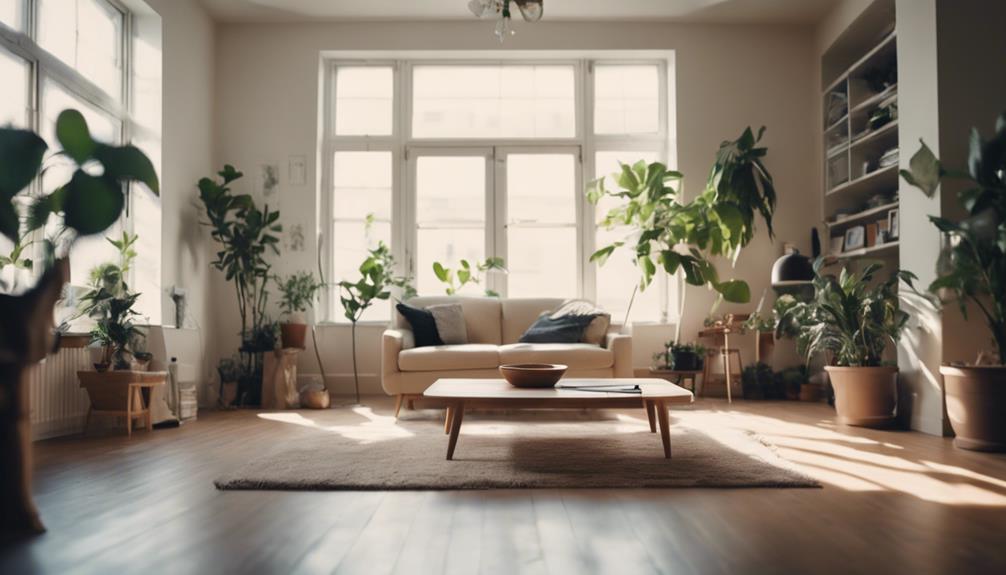
Regularly, we find ourselves drawn to living spaces that reflect our values, aspirations, and personalities, prompting us to intentionally curate our surroundings to foster a sense of harmony and balance.
By doing so, we create an environment that not only mirrors our individuality but also promotes a sense of calm and tranquility. This intentional approach to living spaces allows us to connect with our belongings on a deeper level, appreciating the beauty and significance they bring to our lives.
- A vase overflowing with fresh flowers on a minimalist coffee table
- A cozy reading nook with a plush armchair and a floor lamp
- A vibrant art piece above a sleek, low-profile sofa
- A lush greenery wall bringing in a touch of nature indoors
Overcoming Clutter-Related Stress
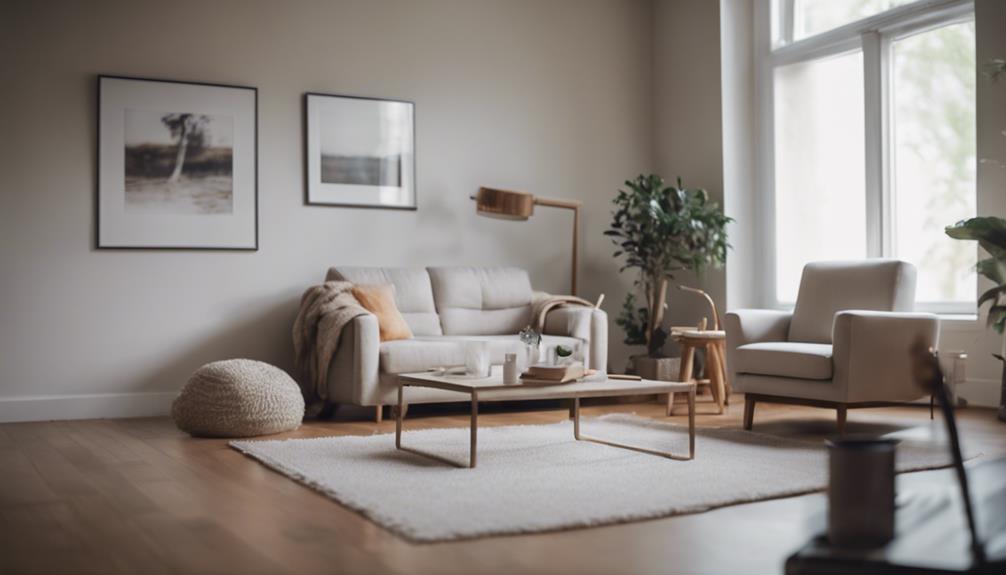
In exploring the overwhelming world of clutter, we've all been there – surrounded by piles of paperwork, stacks of dusty boxes, and a sea of forgotten trinkets, feeling suffocated by the weight of our own possessions.
We feel stressed, anxious, and overwhelmed by the sheer amount of stuff. Clutter can be a significant source of stress, affecting our mental and emotional well-being. Recognizing the emotional attachment we've to our belongings and understanding that it's important to let go is crucial.
Decluttering for a Peaceful Mind
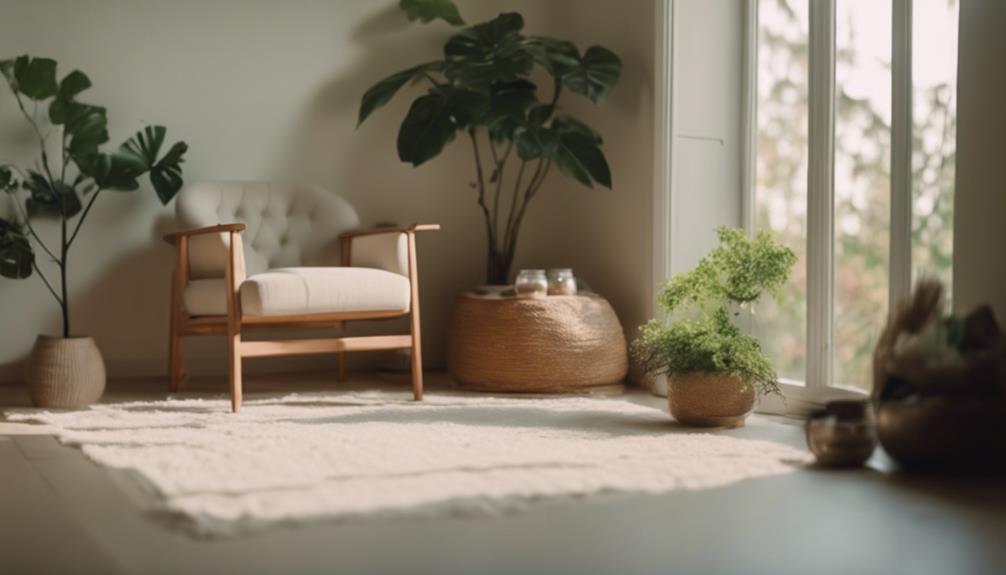
We've all experienced the overwhelming sense of calm that comes with walking into a decluttered space, and it's this feeling that motivates us to continue our journey towards a peaceful mind.
As we declutter, we're not just tidying up our physical space, but also clearing our minds. The clutter-free environment allows us to focus on what's truly important, and our minds begin to unwind. The mental clarity we achieve is invaluable, and it's what drives us to maintain our newfound peace.
- A clutter-free desk, where our thoughts can flow freely
- A tidy closet, where our favorite clothes are easily accessible
- A peaceful living room, where we can relax and unwind
- A serene bedroom, where we can sleep soundly, free from distractions
Frequently Asked Questions
How Do I Maintain Motivation During the Decluttering Process?
We maintain motivation during the decluttering process by setting realistic goals and celebrating small victories.
We schedule regular decluttering sessions and allocate sufficient time for each task, ensuring a sense of accomplishment.
We also focus on the benefits of decluttering, like reduced stress and increased productivity, to keep us motivated.
Additionally, we reward ourselves after completing tasks and involve friends or family for support, making the process more enjoyable and keeping us on track.
Can I Declutter With a Family Member Who Resists Change?
Coincidentally, we've all been there – trying to declutter with a family member who resists change. It's frustrating, but don't give up!
Start by having an open conversation about the benefits of decluttering and how it can positively impact your shared living space. Identify areas of common ground and work together to create a decluttering plan that suits both parties.
Be patient, empathetic, and respectful of their attachment to certain items.
What Are Some Creative Ways to Repurpose Old Items?
When it comes to repurposing old items, we love getting creative!
We turn old mason jars into planters, transform vintage windows into mirrors, and upcycle t-shirts into reusable bags.
We also breathe new life into old furniture by refinishing or repainting it.
Plus, we use old cardboard tubes to organize cables and turn old maps into unique wall art.
How Do I Handle Sentimental Items That Hold Emotional Value?
We're torn between holding onto sentimental items and letting go of the emotional weight they carry.
We agonize over what to keep, what to discard, and how to respect the memories attached to each item.
We try to separate the memory from the physical object, asking ourselves if the item truly brings us joy or serves a purpose.
Is It Possible to Declutter on a Tight Budget With Limited Resources?
We can declutter on a tight budget with limited resources by getting creative. Start by utilizing items you already have, like repurposing storage containers or using old boxes.
Swap or borrow items from friends or family instead of buying new. Take advantage of free online resources, like tutorials and organization apps.
Additionally, schedule regular decluttering sessions to maintain progress without breaking the bank.
Conclusion
As we conclude our journey through the art of decluttering, we're left with a sense of anticipation – what lies ahead for those who dare to let go?
Will we find ourselves in a state of serene calm, surrounded by only what sparks joy? Or will we stumble upon a hidden sense of self, freed from the weight of unnecessary possessions?
The path ahead is unclear, but one thing is certain: the transformative power of decluttering awaits, ready to reveal the doors to a life of intention, simplicity, and profound freedom.
